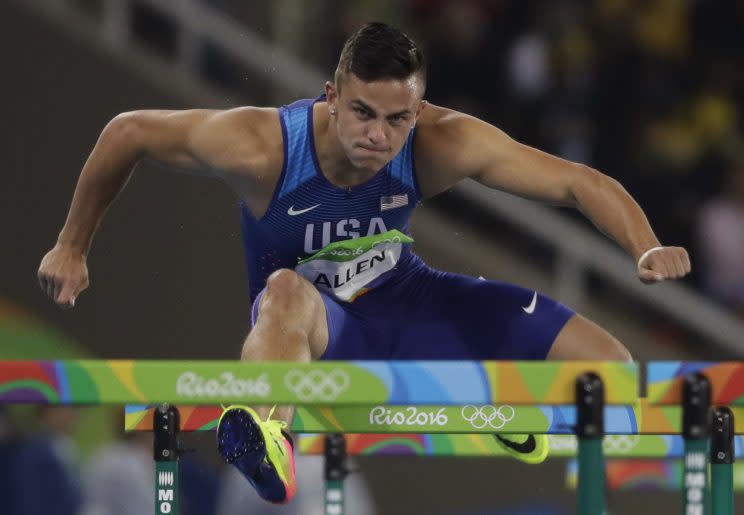How Olympic hurdler Devon Allen juggles college football and track

Medal count | Olympic schedule | Olympic news
RIO DE JANEIRO — The morning after he took first place in the 110-meter hurdles at the U.S. Olympic trials last month, Devon Allen dropped by the Oregon football office.
He wanted an advance copy of the playbook so that he could help the walk-on who would be taking his spot in practice at wide receiver while he was preparing to compete in Rio.
“That shows how he thinks,” Oregon offensive coordinator Matt Lubick said. “He just won the trials, and he’s already thinking of someone else. He’s always putting his teammates first.”
In an era of specialization in sports, Allen stands out as an exception, the rare athlete capable of juggling two sports without harming his performance in either. The 21-year-old has emerged as an NFL wide receiver prospect and a world-class hurdler thanks to his unusual blend of exceptional speed, unshakable confidence and relentless work ethic.
When the 110-meter hurdle competition resumes on Tuesday night in Rio, Allen will be a favorite to not only make the final but also leave with a medal hanging from his neck. His Olympic trials-winning time of 13.03 seconds is the second fastest in the world this year behind only Omar McLeod of Jamaica.
“Devon is amazing,” fellow American hurdler Ronnie Ash said. “The fact that he can compete at a high level in football, then turn around and hurdle? It’s spectacular. You don’t see it that much. You’ve got a couple guys who have done it at the high school level. Not really at the height he’s done it.”
Allen’s brilliance on the track this summer will leave him with a difficult decision to make when he returns home from Rio.
Having already captured two USA Outdoor national titles and two NCAA titles in the 110-meter hurdles, Allen probably has accomplished enough to receive some enticing offers from potential sponsors should he decide to turn pro in track. Those offers could increase further if he adds Olympic gold to his trophy case.
Endorsement contracts are a primary source of income in professional track, but Allen would render himself ineligible to play college football anymore if he signed with a corporate sponsor. The only way he can turn pro in track and still play football at Oregon would be to hire a track-only agent and solely accept prize money.
Allen insists he’s undecided, yet he doesn’t sound like someone ready to give up either sport anytime soon. There’s a good chance he’ll transition back to playing wide receiver for Oregon after the Olympics and then take a hard look at his future in both sports once the football season is over.
“If anyone has a chance [to keep doing both], I have one of the best,” Allen said. “I’m trying to block it out and focus on running fast here and winning a gold medal. I’ll worry about that later.”
Switching between the sports comes naturally to Allen because he has been doing it since high school. He typically sheds about 8 to 10 pounds during track season and then puts it back on in the weight room for football.
The biggest threat to Allen’s future in either sport was the torn knee ligaments he suffered returning the opening kickoff of the Rose Bowl against Florida State about 20 months ago. He pasted on a smile after the game and beat doctors’ estimates by returning in time for the 2015 football season, but it became clear that he lacked the explosiveness he showed during a breakout campaign the previous winter.
While Allen recorded just nine receptions for 91 yards and did not attempt a return last season, he found other ways to contribute. He became Oregon’s best downfield blocker and a team leader in the locker room.
Over the course of track season, Allen’s speed gradually returned. He won the NCAA title despite clipping four or five hurdles in the final and then he ran a much cleaner race at the Olympic trials to outclass a loaded field and clinch a spot in Rio.
“I don’t like to speak about that race too much, but I could have given him better competition,” Ash said with a smile. “He got out on me that day.”
One of the fun aspects of the buildup to Rio for Allen has been the support he has received from his football teammates and coaches.
They donned “Team Allen” shirts at Hayward Field during the Olympic trials. They sent him dozens of good luck texts and tweets this week. And they altered their practice schedule Monday and Tuesday so they could watch Allen’s races together on the big screen in the team meeting room.
“I was trying to give those guys a shout-out on NBC while they were watching,” Allen said. “It means a lot for them to take the time to watch me.”
The race the Ducks football players witnessed Allen run on Monday night was not his smoothest. He advanced to the semifinals despite experiencing pre-race nerves during a rain delay, failing to clear several hurdles cleanly and then chopping his steps before the seventh hurdle to compensate for getting out of rhythm.
That Allen still finished second in his heat despite the mishaps demonstrates his potential. He is capable of going under 13 seconds if he runs a clean race Tuesday night.
“He’s such a good example of being able to accomplish anything when he believes in himself,” Lubick said. “Our guys see the way he works. If he’s able to win a medal, it would inspire our whole football team.”




